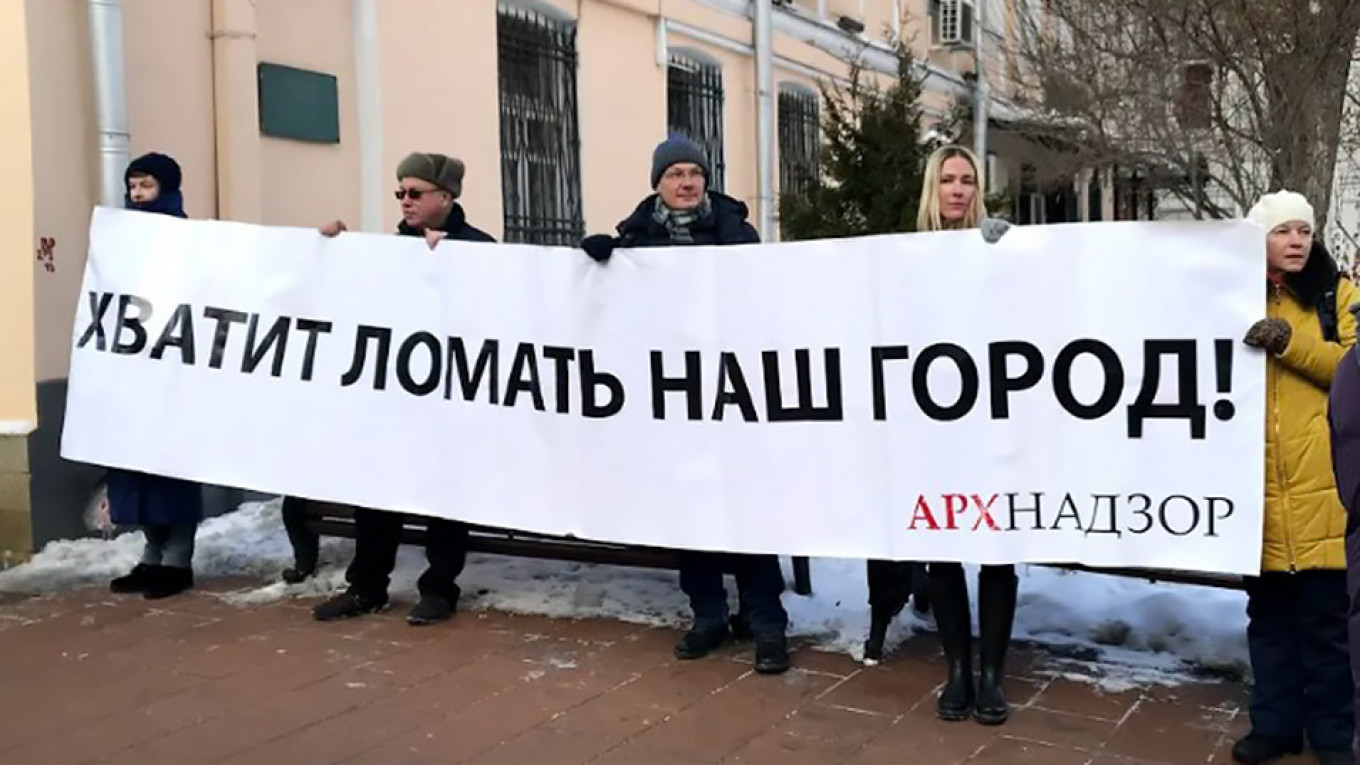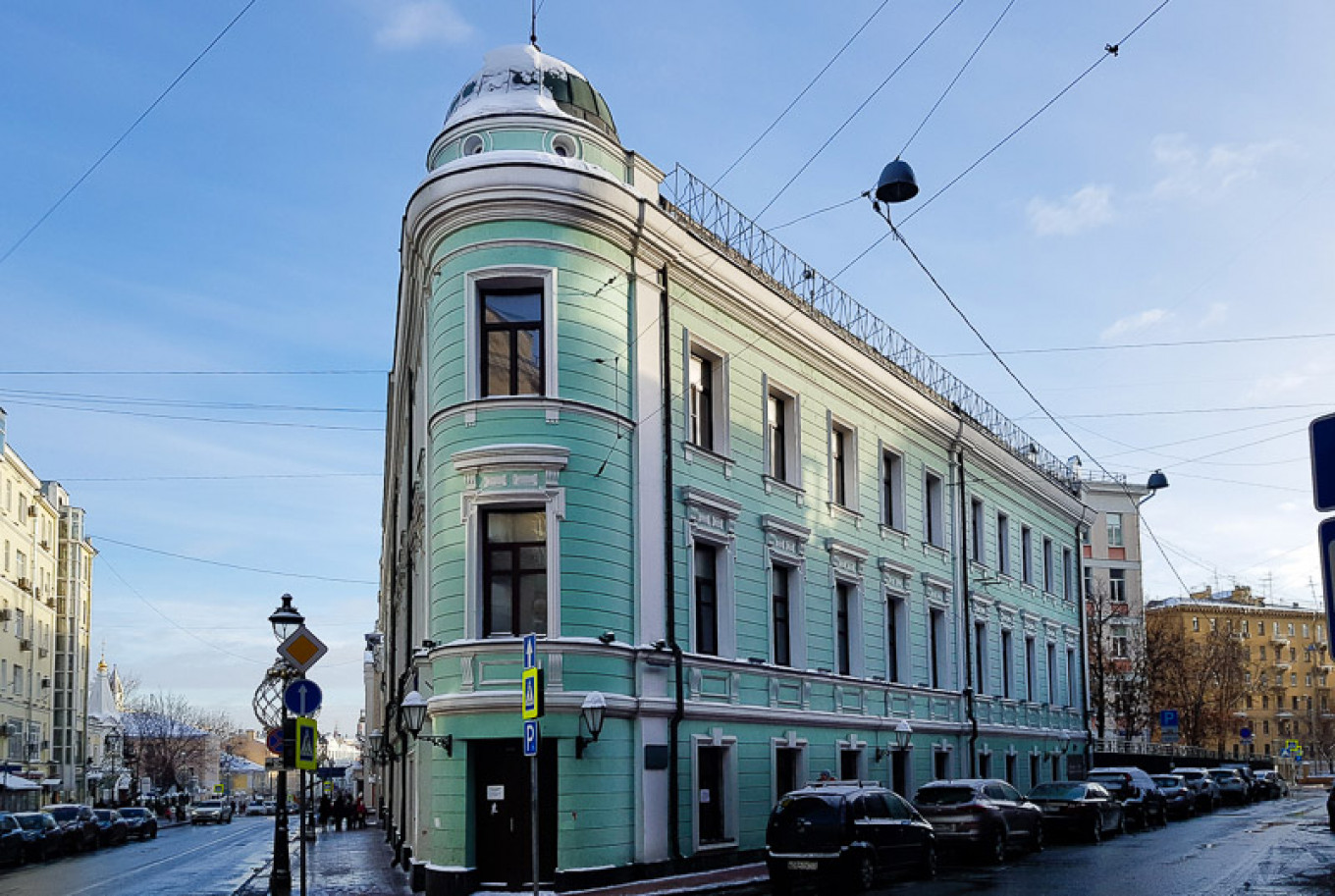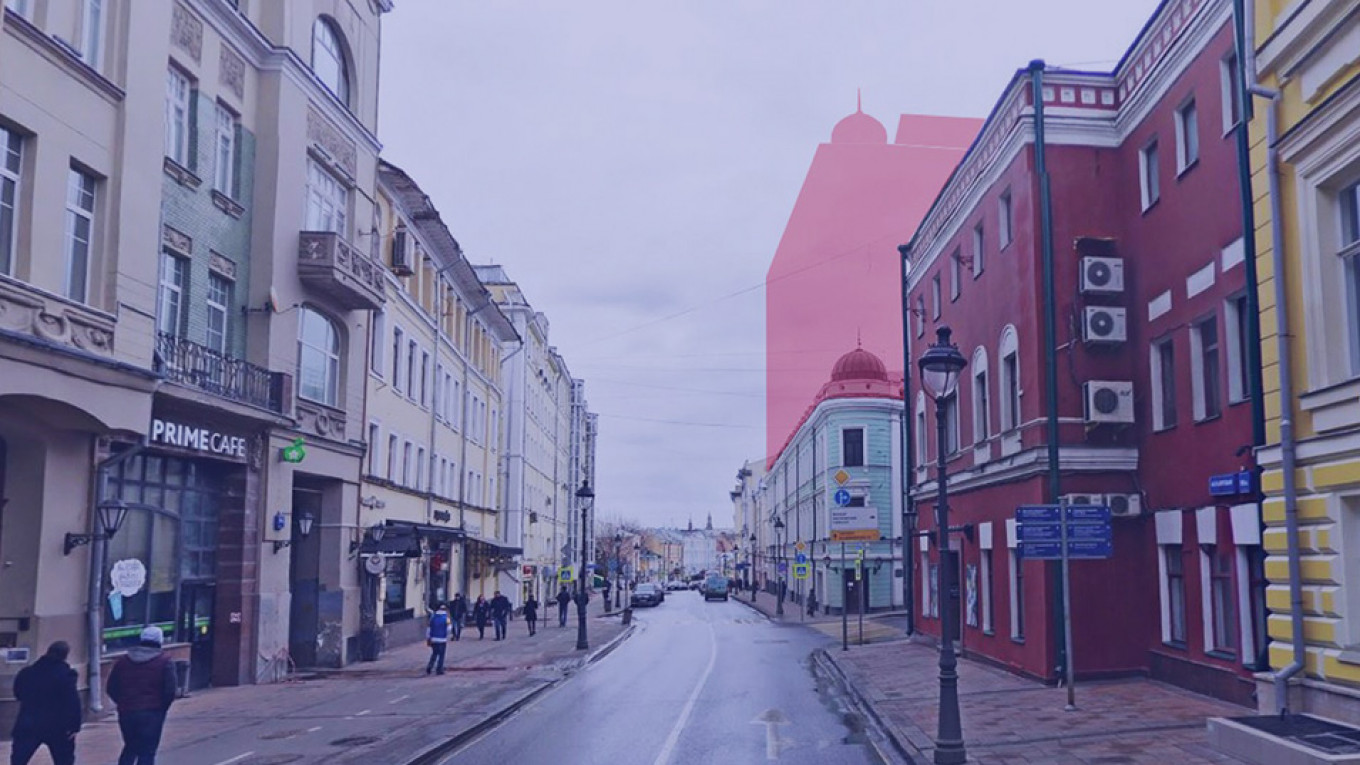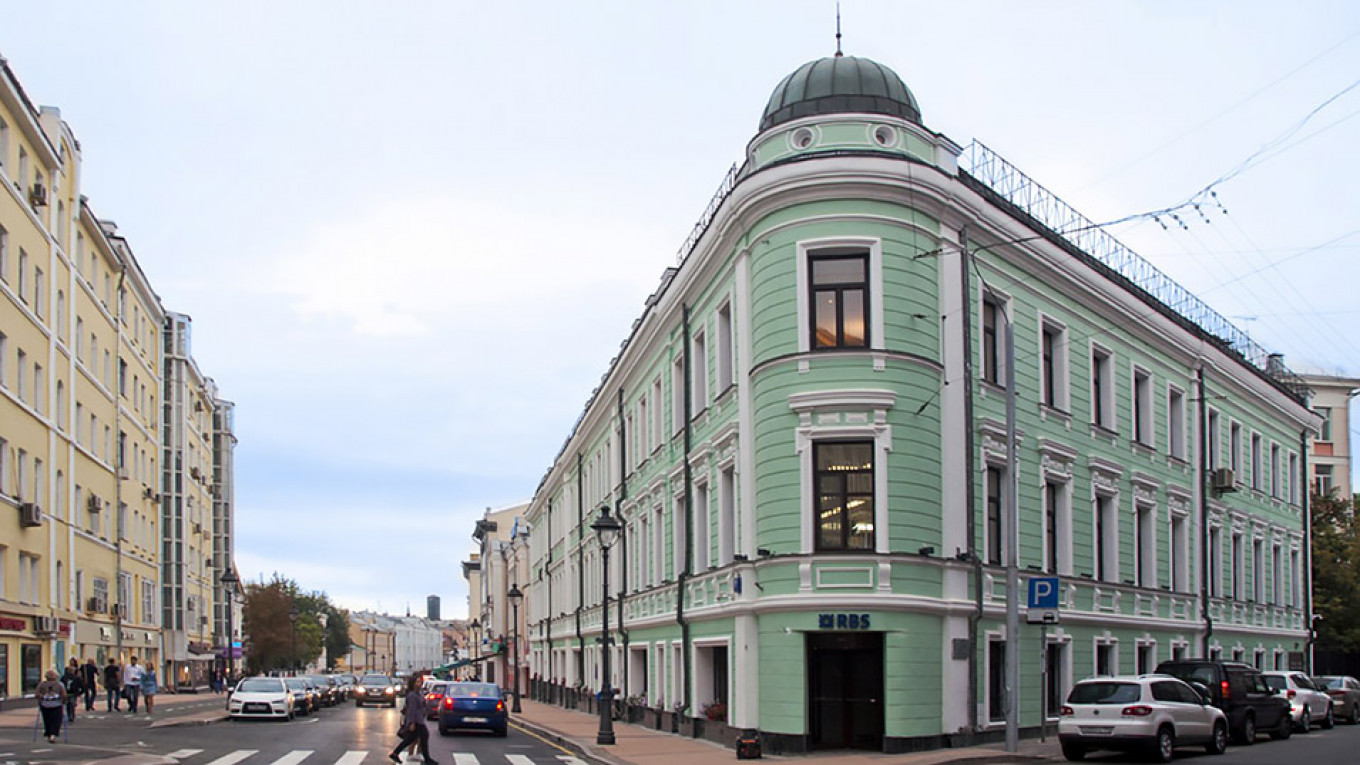On a cold but sunny afternoon rare for Moscow in mid-winter, a dozen activists stand shivering but resolute on Ulitsa Bolshaya Nikitskaya.
They hold up large banners: “Stop tearing down our city!” and “Vandals are at work here!” prepared by the volunteer architecture preservation group Arkhnadzor. Passersby continually stop to read the banners and ask the demonstrators questions, while reporters from several Russian news stations jockey for position around the growing crowd.
Arkhnadzor’s demonstration is taking place one day before a scheduled public hearing to decide the fate of the Buloshnikov House, a dwelling with strong ties to Russia's literary history. Will it be turned into a nine-story “elite” apartment building or will its historical appearance remain untouched?

The house
The house stands at 17 Ulitsa Bolshaya Nikitskaya, a street called “the museum of classicism” for its well-preserved classical manor houses and public buildings that stretch, virtually unchanged for over 200 years, from the old university buildings across from the Kremlin to the Boulevard Ring.
Constructed in 1830 by a Moscow merchant by the name of Buloshnikov, the three-story manor, painted mint green with white trimmings, stands a few doors up from the Moscow Conservatory (established 1866). Its rounded corner is perfectly aligned with the rounded corner of the red Mayakovsky Theater (established 1886) across the street from it.
Members of Arkhnadzor consider the structure a part of cultural heritage not only because it has survived nearly two centuries in excellent condition, but also because the structure once housed the commercial office of the literary magazine “Musaget.” “Musaget” published several authors and poets of Russia’s Silver Age, and literary titans such as Andrei Bely, Alexander Blok, Vycheslav Ivanov and Valery Bruisov often gathered at this manor.

The developer
In mid-December, a former deputy from the district, Elena Tkach, published on her Facebook page an official report from Moscow’s Urban Development and Land Commission (DLC). The DLC had agreed to consider the request of Main Estate developers to revise the property and land-use rules for the house so that the developers could build an apartment complex on this site. The post hit a nerve.
Maria, a young analyst who passed Arkhnadzor’s demonstration, told The Moscow Times that tearing down historic buildings had become something of an epidemic in Moscow. “All bloggers, journalists and activists who might have earlier stayed at home are now coming out to stop things like this.”
According to a report by the news outlet Noviye Izvestie, 159 buildings of historical and cultural importance have been torn down in Moscow between 2010 and 2018 – all during Moscow Mayor Sergei Sobyanin’s tenure.
In particular, two years ago developers at the company Lead Estate received permission to tear down Nekliudov House in the city center. When people learned that the historic 19th-century manor would be replaced by luxury apartments, there was a flurry of protests. But they did not stop or even delay the destruction of Nekliudov House.
Fury tripled when activists learned that the Lead Estate company that tore down Nikliudov House and the Main Estate company petitioning to change the Buloshnikov House are owned by the same person.

The problem
Ivan Borisov, an organizer at Arkhnadzor, told The Moscow Times that the Buloshnikov House does not have protected status. So the public meeting would just allow residents to discuss the parameters of construction, such as the proposed nine-story height of the new residential complex.
“For the development company to build this new building, the only thing that they need to do is change the rules of the accepted height of buildings in this neighborhood, and those changes can be made only after public hearings. So residents can only save the building by refusing to grant a change in the permissible height of structures in this area,” Borisov said.

The public hearing
The day after the protests, about 700 citizens poured into the seventh floor of the Moscow College of Business Technology. When the hall reached capacity, people stood packed in the hallway or sat on the first floor where a live stream of the proceedings was being broadcast.
Officials from the district’s construction agencies and representatives of the Moscow Architectural Committee sat on the podium. Throughout the meeting, officials on the panel struggled to be heard as the audience, which seemed entirely opposed to the project, grew louder and angrier, continually shouting “disgrace!” throughout the reading of regulations and protocol for the public hearing.
Noted architect and professor Nikita Shangin took the microphone when questions from the floor were opened. “Let's think about whether such a discussion would be possible anywhere in Switzerland, France or Italy,” he said. “In those countries, even posing such a question would mean the complete end of any public official’s career. Public figures and state authorities there know very well that the historical and architectural heritage is a national resource that the state must protect. There the question itself is not only blasphemous, but also criminal.”
The crowd erupted into boisterous applause during Shangin’s speech, which officials tried several times to interrupt. After Shangin spoke, the officials on the podium declared the hearing closed and fled the hall under another volley of jeers and boos. The public hearing ended at 7:40 p.m., though it had been scheduled to go on for another two hours.
The uncertain future
Despite the public hearing's abrupt ending, officials invited district residents to send in their commentary. According to the DLC report published by Tkach, Main Estate developers must receive a positive evaluation of their petition from the public hearing before they can start building. If a negative result is received, the petition will be returned to the DLC for re-examination.
Meanwhile, opposition continues. A petition to Mayor Sobyanin against construction organized by Attention, a historical heritage conservation fund, quickly garnered nearly 20,000 signatures. High-profile individuals in Moscow, including the journalist and writer Vladimir Pozner, have spoken out against the project.
Rustam Rakhmatullin, a coordinator at Arkhnadzor, told The Moscow Times that, aside from destroying the architectural unity of the buildings on one of Moscow’s oldest streets, there are circumstances surrounding the construction plan that strike him as unusual. “To put a high-rise between the conservatory and the theater – this is not a normal request,” he said. “But the mayor immediately agreed to it. The fact that he agreed so quickly suggests that this is not an ordinary construction project.”
When contacted for commentary, neither Mayor Sobyanin’s office nor the office of Moscow’s chief architect Sergei Kuznetsov was available for comment. The chief architect’s press secretary mentioned only that Kuznetsov had not seen the proposed construction project for the site.
A few days after the public hearing, Mayor Sobyanin published on his official website a brief statement in which he called for the arguments for and against construction at Bolshaya Nikitskaya to be “calmly analyzed” and suggested that further expert evaluation of the matter be undertaken.
A Message from The Moscow Times:
Dear readers,
We are facing unprecedented challenges. Russia's Prosecutor General's Office has designated The Moscow Times as an "undesirable" organization, criminalizing our work and putting our staff at risk of prosecution. This follows our earlier unjust labeling as a "foreign agent."
These actions are direct attempts to silence independent journalism in Russia. The authorities claim our work "discredits the decisions of the Russian leadership." We see things differently: we strive to provide accurate, unbiased reporting on Russia.
We, the journalists of The Moscow Times, refuse to be silenced. But to continue our work, we need your help.
Your support, no matter how small, makes a world of difference. If you can, please support us monthly starting from just $2. It's quick to set up, and every contribution makes a significant impact.
By supporting The Moscow Times, you're defending open, independent journalism in the face of repression. Thank you for standing with us.
Remind me later.






